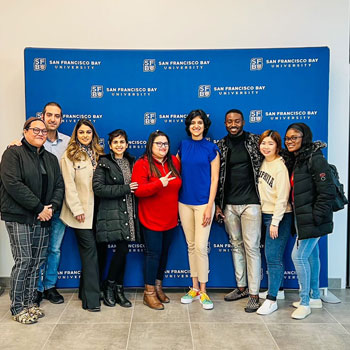10 Job Interview Tips for SFBU Graduates

Well, you’ve graduated. You put in all that time, effort, and hard work to obtain a world-class degree from San Francisco Bay University. So, that’s it, right? The hard part is over and now it’s time to party! Wrong. Certainly, you should celebrate. Completing one of SFBU’s programs is no small task. Bask in the glory. But that doesn’t mean there is no more work left to do.
Now, it’s time to put that degree to good use and land yourself a job - and build a career - that you love. But how do you do that? How do you apply the skills you’ve learned to get a job in your field of study? And how do you stand out in a crowd of recent college graduates? Don’t worry, that’s where we come in.
Fortunately, all it takes is a little preparation. From researching the company to practicing your interview skills and following up after the interview - each of these steps will get you a little closer to “You’re hired!” So, without further delay, let’s dig into each of our top interview tips, plus a couple extra for good measure!
1. Research the Position and Company You’re Interviewing For
Even though companies across the country face a worker shortage, that doesn’t mean landing an interview and getting the job is a cake-walk. Employers notice when you attend a college or university in Northern California because the California university system is held in high regard. And if you apply for a job in California, you will be competing with students who’ve all had a stellar education. It is vital that you stand out and prove to your potential employer that you’ve done your homework and deserve the job more than all those other people.
Researching the company before you actually go to the interview shows initiative. It allows you to talk more knowledgeably about why you think you are a good fit for the company. It also demonstrates your interest and enthusiasm for the job. And finally, it shows a high level of professionalism and diligence. Consider researching the following about your prospective employer:
- Products
- Services
- Mission Statement
- History
- Culture
Now that you’ve done your research, it’s time to prepare yourself for the questions that are sure to come.
2. Prepare Thoughtful Answers to Common Questions
Regardless of where you interview, it is highly likely you will get this question: “Why do you want to work here?” While this question may seem benign, the interviewer is asking it for a specific reason. They want to know how much time you took to research the company! We’ve covered the research options above, now you have to prepare your answers.
As you answer questions, ensure you mention the aspects of the company that appeal to you and align with your career goals. Does the company donate to causes you support? Do they offer benefits you find particularly appealing? These are appropriate points of common interest. Feel free to use them as you demonstrate your knowledge of the company.
3. Prepare Intelligent Questions to Ask Your Interviewer
A job interview is a two way street. Not only is it about finding out if you are a good fit for the company; it’s also about if they are a good fit for you. Your questions go a long way in determining this. And knowing what questions to ask demonstrates just as much initiative as asking the right questions. If you end up sitting there only talking when talked to, it’s highly unlikely you’ll get a call back.
A good rule of thumb is to prepare at least two questions to ask your interviewer, and more if you feel comfortable. Memorize them if you can. You want to ask questions specific to the company, but also consider the following generic options:
- What would a typical day in the position look like?
- How would you describe the company culture?
- What are your biggest challenges/opportunities at the moment?
- What is your favorite/least favorite thing about working here?
- How do you measure performance/success?
Also, consider creating a one-minute “elevator pitch” to explain your experience. Be simple and concise. You don’t want to come off as arrogant or long-winded.
So, you’ve done your research and figured out appropriate questions. What’s next? It’s time to practice, practice, practice!
4. Practice With a Friend
You can prepare all you want, but if you don’t apply your preparation to real-world practice, you’ll never become an expert. You won’t be ready. Deliberately practicing what you have prepared has several beneficial effects. Not only do you get better at doing what you practice, but you increase the odds of success (“You’re hired!”) when it matters most. You’ll also start to replace old habits with new habits. Research shows the power of habits and how to change, modify, or develop them.
Practicing with a friend also provides you with the ability to correct mistakes. The last thing you want to do is slip up while you’re in the interview. Be sure to give your practicing partner the green light to be critical, provide honest advice, and give tips and pointers where applicable. You don’t want them to be afraid to critique you. Once you feel ready, it’s time to take a deep breath and head to the interview! Let’s talk about the impression you want to make.
5. Dress Professionally, Be Clean, and Well-Groomed
The power of practice is not the only one proven (say that five times fast!). There is also a lot of power in the first impression. There is plenty of research to prove first impressions are long-lasting. How you dress and groom yourself is absolutely a part of your overall evaluation for the job. Dress professionally, practice good hygiene, cut your hair, and look your best. This is the time to do it.
Today, we live in the age of Zoom, so you may end up doing interviews remotely. That doesn’t mean, however, that it should be business up top and casual on the bottom. When you dress professionally from head to toe, it helps you get into the right mindset. Don’t short change how you look simply because you are not physically in the room with your interviewer.
6. Bring a Resume, Notebook, Pen, and Business Cards
Being prepared for the interview goes beyond questions and answers. Make sure you show up with the tools you need to follow along, take notes, ask follow up questions, and leave your contact info. No matter how much you prepare, it is likely you will need to write something down. Doing so also shows initiative. It proves to your interviewer that you come ready, no matter the situation.
If you are concerned about walking into your interview with an armful of items, consider a thin laptop bag or portfolio. This way you can organize your things and add a bit of flash and pizzazz to your first impression.
7. Arrive 10 to 15 Minutes Early
There’s a saying: Being early is arriving on time. And when it comes to job interviews, it is absolutely true. Arriving early isn’t only about impressing your interviewer. It’s also about allowing yourself some time to de-stress, take a deep breath, and collect your thoughts. You’ll have time to go over your questions again and prepare your answers.
Consider the journey as well. In today’s society, it is a little too easy to rely on your smartphone to get around. But phones run out of power and GPS signals and maps aren’t always reliable. After the experience of attending a university in San Francisco or the surrounding area, you are well aware of how congested the traffic can be. Plan your journey, mark your directions, and leave extra early to account for the unexpected. And if you do rely on an app, consider Waze, as it will alert you to unexpected events that other map apps might miss.
8. Turn Off Your Cell Phone
This may seem obvious, but far too many people make the mistake of not silencing their phone during an interview. Sure, you may not get passed over simply because it accidentally rings, but your interviewer is evaluating every aspect of the interview. Not silencing your cell phone shows a lack of preparation and will reflect as a ding against you.
Turning your cell phone off also prevents distractions. With the tons of notifications we all get on our phones all day long, the last thing you need is noises or vibrations of all types causing you to forget one of your important questions. Also, avoid checking your phone during the interview. Nothing says “I couldn’t care less” more than when you look at your phone while you are interacting with someone, interview or no.
9. Treat Every Person You Meet Politely and With Respect
Being polite and respectful is important not just because it might get you a job, but because it is the right thing to do. It also demonstrates professionalism and the ability to get along with people, which are both pretty important when it comes to working with others.
Consider that you are probably being evaluated not just on how you treat your interviewer, but also on how you treat the receptionist or other office workers. If you are nice to your interviewer but rude to everyone else, don’t expect to get the job. Demonstrate a sunny demeanor, smile a lot, and be gracious. Consider this advice not just for a job interview, but for life.
10. Be Confident and Make Eye Contact During Your Interview
You don’t want to have a disconnect between what you say and how you act. You can have all the best answers and ask all the right questions, but if you aren’t confident, your interviewer will see that. Sit up straight, don’t mumble, and make eye contact with your interviewer.
There is a fine line between confidence and arrogance. Both stem from one’s belief in oneself, but arrogance is a result of an exaggerated sense of self. Sure, you just graduated from the best university in San Francisco and the Bay Area, but don’t make that the sole focus of your interview. Don’t spend the entire time talking about your accomplishments, but when you do, tie them back into how they will enhance your ability to do the job you’re applying for.
Your Two Bonus Tips
Wow! That was fun, right? Well, we aren’t done yet. We’ve got a couple bonus tips for you to ensure you ace your post-SFBU interview. These final tips will be the cherry on top of your successful job interview.
First, consider using the S.T.A.R. method as you answer questions and interact with your interviewer. The acronym stands for:
- Situation: A situation you had to deal with.
- Task: The task you were given to do.
- Action: The action you took.
- Result: What happened as a result and what you learned from the experience.
If you have problems coming up with ways to explain your accomplishments, the S.T.A.R. method may help. Indeed, many interviewers use the S.T.A.R. method themselves when evaluating what questions to ask, so if you use it in preparing answers, you are ahead of the game.
And finally, don’t forget to give thanks. Thank your interviewer for the opportunity to speak in person or over Zoom, then also thank them via email or a hand-written note. After all, you want to make sure your last impression is a good one.
Now that you’ve learned what you need to do, it’s time to apply it. Ace your next interview with SFBU’s top tips for a winning interview!


